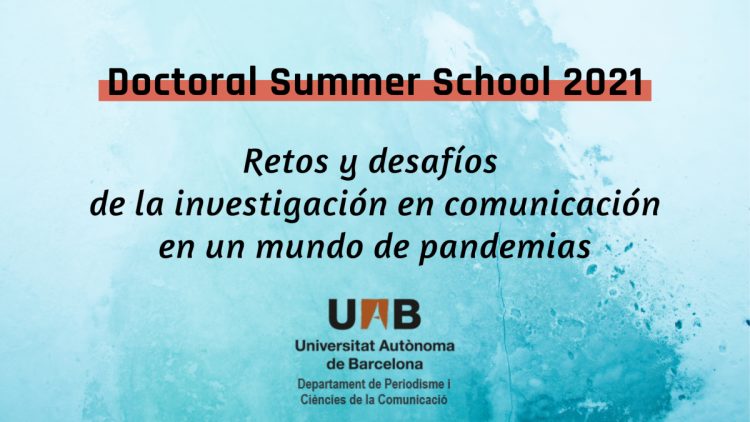Academic specialists and doctoral students from around the world met at the Doctoral Summer School 2021 to discuss the challenges of communication research in a world of pandemics. The event, organised by the Gabinete de Comunicación y Educación of the Universitat Autònoma de Barcelona (UAB) Department of Journalism and Communication Sciences, took place on 5, 6 and 7 July, virtually.
The participants, from Europe, Latin America and Asia, gave life to the various training activities of the Doctoral Summer School, which this year celebrated its ninth edition. During the event’s three days, participants reflected on topics such as digitalisation in journalism, media literacy and political communication.
On the first day, the inaugural conference was given by Claudio Celis Bueno from the Scuola Universitaria Superiore Sant’Anna Pisa (Italy). The researcher explained how content moderation is important for the protection of users in the online environment. In this line, he also spoke about the automation of common sense and the caution with which technology should be used for this purpose.
He was followed by Luis Miguel Pedrero from the Universidad de Nebrija (Spain), who addressed the subject of radio’s evolution and adaptation to the digital ecosystem. In this regard, the specialist highlighted the current boom in podcasting and pointed it out as a tool to reconnect radio with younger audiences. This conference was organised by the research group Gabinete de Comunicación y Educación.
This first day closed with the first Working Doctoral Group. Professor Carmina Crusafon from the UAB moderated the interventions of doctoral students Jordi Badia Perea, Juan Pablo Cannata Ramos, Javier Durán Ramírez and Carlos Peña Orozco. Each presented the progress of their doctoral research and received comments from their peers.
On 6 July, the second day of the Doctoral Summer School, the Journal Club was organised by the journal Anàlisi. In this space, the research projects ‘Venezuelan mass migration in Colombia: a study of news framing in reference cybermedia’, by Gabriel Lotero-Echeverri, Luis M. Romero-Rodríguez and M. Amor Pérez-Rodríguez, and ‘Cultural slow journalism in Spanish: Case studies from Spain, Mexico and Colombia’ by Carmen Peñafiel, Beatriz Zabalondo and Alazne Aiestaran were presented. In this way, the event participants had the opportunity to learn from the authors of the publications about the research process they carried out. They were also able to ask them questions that enriched the academic debate.
This was followed by two conferences. The first was ‘GMMP Who is in the news: Beijing +25 Balance – Global Media Monitoring Project’, given by Professor Mª Teresa Vera Balanza from the Universidad de Málaga (Spain) and organised by the research group Laboratorio de Periodismo y Comunicación para la Ciudadanía Plural (Laboratory of Journalism and Communication for Plural Citizenship). And the second was ‘Anti-feminist propaganda on the web as a political strategy: the case of Vox’, given by Professor Asunción Bernárdez of the Universidad Complutense de Madrid (Spain) and organised by the Observatory of Spanish fiction and new technologies (OFENT).
The second Working Doctoral Group was also held. The doctoral students Pedro Nicolás Aldana Afanador, Mariana Alencar Dornelles, Alicia Tamayo Rodríguez and Gabriel Torres Espinoza participated in this occasion. The interventions were moderated by Professor Santiago Giraldo Luque of the UAB.
The third day opened with the conference ‘Narrative Anatomy of Fake News in times of pandemic in Brazil’, given by Professor Fabiana Piccinin from the Universidade Federal de Santa Catarina (UFSC) (Brazil) and organised by the Laboratory for Prospective and Research in Communication (LAPREC) of the UAB. The specialist presented how disinformation about the coronavirus has grown in the South American country, and how politicians have promoted it.
On the last day, the third and fourth Working Doctoral Groups were held in parallel. One in Spanish and the other in English. The doctoral students participating in the first group were Eman Elsayed Elshamy, Jingya Hao, Engy Hassan Shaker, Ahmed Nazih Toubal and Wei Wang, and the moderator was Professor Laura Cervi from the UAB. The second group consisted of Alexandre Lavado Campas, Tomás Cajueiro, Olga Casado Rodríguez, César Eduardo Gordillo and Nelly Guamán Guadalima, and was moderated by Santiago Giraldo Luque.
Finally, the closing lecture was given in English by Luz Mar González-Arias from the Universidad de Oviedo (Spain). She presented ‘Communicating COVID-19: Media, Literary and Artistic Responses to Lockdown’. This presentation closed the series of reflections generated around the main theme of the Doctoral Summer School 2021, and opened lines of debate on, for example, the responsibility of the media in the media literacy of the population.

